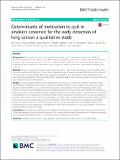Files in this item
Determinants of motivation to quit in smokers screened for the early detection of lung cancer : a qualitative study
Item metadata
| dc.contributor.author | Young, Ben | |
| dc.contributor.author | Vedhara, Kavita | |
| dc.contributor.author | Kendrick, Denise | |
| dc.contributor.author | Littleford, Roberta | |
| dc.contributor.author | Robertson, John F. R. | |
| dc.contributor.author | Sullivan, Frank M. | |
| dc.contributor.author | Schembri, Stuart | |
| dc.contributor.author | das Nair, Roshan | |
| dc.contributor.author | ECLS study team | |
| dc.date.accessioned | 2018-11-20T12:30:05Z | |
| dc.date.available | 2018-11-20T12:30:05Z | |
| dc.date.issued | 2018-11-20 | |
| dc.identifier | 256486277 | |
| dc.identifier | c20defb8-5029-4bb4-8eee-ce24f19fa039 | |
| dc.identifier | 85056720458 | |
| dc.identifier | 000451320400007 | |
| dc.identifier.citation | Young , B , Vedhara , K , Kendrick , D , Littleford , R , Robertson , J F R , Sullivan , F M , Schembri , S , das Nair , R & ECLS study team 2018 , ' Determinants of motivation to quit in smokers screened for the early detection of lung cancer : a qualitative study ' , BMC Public Health , vol. 18 , 1276 . https://doi.org/10.1186/s12889-018-6211-1 | en |
| dc.identifier.issn | 1471-2458 | |
| dc.identifier.other | ORCID: /0000-0002-6623-4964/work/51010310 | |
| dc.identifier.uri | https://hdl.handle.net/10023/16508 | |
| dc.description | Funding: Dundee Cancer Centre Development Fund. Oncimmune Ltd. and Chief Scientist Office, Scottish Government funded the ECLS Study. | en |
| dc.description.abstract | Background: The promotion of smoking cessation within lung cancer screening could lead to benefits for smoking-related disease and improve cost-effectiveness of screening. Little is known about how smokers respond to lung cancer screening and how this impacts smoking behaviour. We aimed to understand how lung cancer screening influences individual motivations about smoking, including in those who have stopped smoking since screening. Methods: Thirty one long-term smokers aged 51–74 took part in semi-structured interviews about smoking. They had been screened with the EarlyCDT-Lung Test (13 positive result; 18 negative) as part of the Early Cancer Detection Test Lung Cancer Scotland Study. They were purposively sampled for interview based on their self-reported post-screening smoking behaviour. Eleven participants had stopped smoking since screening. Verbatim interview transcripts were analysed using thematic analysis. Results: Two key overarching themes were interpretations of screening test results and emotional responses to those interpretations. Participants’ understanding of the risk implied by their test result was often inaccurate, for example a negative result interpreted as an ‘all-clear’ from lung cancer and a positive result as meaning lung cancer would definitely develop. Those interpretations led to emotional responses (fear, shock, worry, relief, indifference) influencing motivations about smoking. Other themes included a wake-up call causing changes in perceived risk of smoking-related disease, a feeling that now is the time to stop smoking and family influences. There was no clear pattern in smoking motivations in those who received positive or negative test results. Of those who had stopped smoking, some cited screening experiences as the sole motivation, some cited screening along with other coinciding factors, and others cited non-screening reasons. Cues to change were experienced at different stages of the screening process. Some participants indicated they underwent screening to try and stop smoking, while others expressed little or no desire to stop. Conclusions: We observed complex and individualised motivations about smoking following lung cancer screening. To be most effective, smoking cessation support in this context should explore understanding of screening test results and may need to be highly tailored to individual emotional responses to screening. | |
| dc.format.extent | 13 | |
| dc.format.extent | 1352285 | |
| dc.language.iso | eng | |
| dc.relation.ispartof | BMC Public Health | en |
| dc.subject | Smoking cessation | en |
| dc.subject | Early cancer detection | en |
| dc.subject | Lung cancer | en |
| dc.subject | Teachable moment | en |
| dc.subject | Thematic analysis | en |
| dc.subject | RC0254 Neoplasms. Tumors. Oncology (including Cancer) | en |
| dc.subject | E-DAS | en |
| dc.subject | SDG 3 - Good Health and Well-being | en |
| dc.subject.lcc | RC0254 | en |
| dc.title | Determinants of motivation to quit in smokers screened for the early detection of lung cancer : a qualitative study | en |
| dc.type | Journal article | en |
| dc.contributor.institution | University of St Andrews. Population and Behavioural Science Division | en |
| dc.contributor.institution | University of St Andrews. School of Medicine | en |
| dc.identifier.doi | https://doi.org/10.1186/s12889-018-6211-1 | |
| dc.description.status | Peer reviewed | en |
This item appears in the following Collection(s)
Items in the St Andrews Research Repository are protected by copyright, with all rights reserved, unless otherwise indicated.

